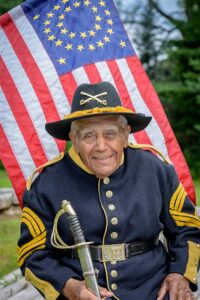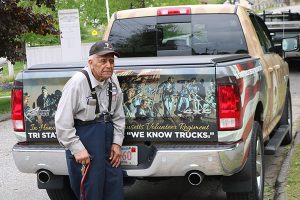By Jane Keller Gordon, Assistant Editor

Photo/Andy Weigl/Weigl Photography
Southborough – As a young man in 1948, Pete DePina volunteered to serve in the U.S. Army. The Southborough resident, reflecting back on his years in the service, noted his surprise that discrimination was prevalent in the military.
“Growing up [in Falmouth, Mass.], my schools weren’t segregated but the Army was and I hated it,” he said.
After DePina’s military service, which included basic training in Fort Riley, Kan., and tours in both Germany and Korea, he returned home to Massachusetts to put down roots. He worked first in construction, and then for the General Motors Car Carrying Division in Framingham. He and his late wife, Elizabeth, moved to Southborough where they lived for 50 years, raising a son, Richard, and daughter, Susan.

Now, at age 86, DePina dedicates himself to ensuring that the military sacrifices and contributions of African Americans are not forgotten. As such, he has become a student and passionate advocate who shares the stories of two legendary regiments specifically, the Tuskegee Airmen, and the Buffalo Soldiers.
The Tuskegee Airmen were the first black military aviators in the U.S. Army Air Corps (AAC), a precursor of the U.S. Air Force. Trained at the Tuskegee Army Air Field in Alabama, they flew more than 15,000 individual sorties in Europe and North Africa during World War II.
In the mid-to late 1860s to late 1890s, the Buffalo Soldiers was the nickname given to a group of renowned African American soldiers who mainly served on the Western frontier following the American Civil War. These men were given the task of controlling the Native Americans of the Plains, capturing cattle rustlers and thieves and protecting settlers, stagecoaches, wagon trains and railroad crews.
Regiments wrote their own history
“Both times, in World War II and in the 1860s, the military did not want to accept African American soldiers,” DePina said. “It took a lot for these groups to be formed, and ultimately they proved themselves.”
Although the proof of their military prowess was delayed, it did come out over the years.
In 2016, DePina attended a celebration of the New England Tuskegee Airmen that was held at the University of Mass. in Boston. One of the pilots who was honored, Charles McGee, was a stellar example.
DePina pointed out that McGee’s contributions were legendary though not fully recognized at the time.
“He had more combat flying time than any other soldier living or retired. McGee retired as a full corporal, but should have had a higher rank,” DePina said.
Similarly, the Buffalo Soldiers gained a reputation as competent military men.
“They got a reputation of never giving up the fight,” DePina said.
“In the beginning, [the Buffalo Soldiers] were insulted by the name, but that changed over time. They found out it meant ‘pride and bravery’”, which in DePina’s opinion was clearly a fitting moniker.
Since he started collecting memorabilia, DePina has accumulated thousands of items such as books, documents and uniforms, some of which he has worn in historic re-enactments.
Approximately 15 years ago, DePina had an opportunity to go back to Fort Riley to witness the dedication of a Buffalo Soldiers’ statue.
“I never wanted to go back there after the segregation I experienced, but my wife said ‘Go back’. I’m glad I did. It was a really good experience,” he said.
Man of perpetual motion
Since his official “retirement,” DePina has not really slowed down, as he works nearly full time at Tri State Truck Center in Shrewsbury.
“Every morning I go there and cause everybody heartaches,” he said with a characteristic chuckle. “I spend about 30 hours a week there doing chores. I have a work ethic that drives people crazy. I don’t like being late. That’s from the military.”
Kevin Holmes, Tri State’s president and CEO, disagrees with DePina’s assessment and actually views him as a source of inspiration.
“Pete is one of the friendliest, kindest and most wonderful men I have ever known. He has been a mentor for many here,” Holmes said.
“We call him the executive V.P. of customer affairs,” he added. “He is such an ambassador of good will and a jack of all trades. He will do whatever is needed for anyone, customers or employees.
“Working keeps him young, but we are so grateful for all of his help. He really makes a difference.”
In fact, to recognize his contributions, three years ago the company gave DePina a special Christmas gift – a Dodge Ram pickup truck. Not content to drive it as mere transportation, DePina instead uses it as a way to honor the military service of African Americans. The truck is adorned with artistic renditions depicting DePina’s missions, including one based on the 54th Massachusetts Volunteer Infantry Regiment, one of the first official African American units to serve in the U.S. armed forces during the Civil War.
A brief conversation with DePina will quickly reveal that he is a man of passion and strong emotion. His connection with history moves him deeply, often bringing a brief tear to his eye.
In his efforts to further the goal of equality, DePina does not fight racial injustice with protest, but rather with education. He chooses instead to celebrate the accomplishments of those who blazed the trail for all soldiers of color and to let history be their legacy.
And like the Buffalo Soldiers he honors…Pete DePina will never give up the fight.












